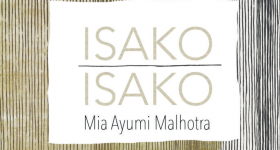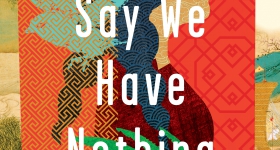As the title’s pun suggests, Joseph Han’s ambitious debut, Nuclear Family, playfully fuses and refuses tropes of the Asian American novel. The titular family, the Chos, are an intimate yet expansive unit, the novel’s nexus as well as its slipknot. The Korean American household of four are settled in Hawai’i and run a Korean restaurant-cafeteria called Cho’s Delicatessen whose charm invites comparisons to Kim’s Convenience. The store, and at some levels the novel, neatly collapses the zones of family, domesticity, community, ethnic enclave, capitalism, colonialism, and globalism, into a single pressurized space, all of it poised to combust.
While this range of registers is explored in Han’s short, alternating chapters (mostly third-person singular perspectives), the novel is primarily a coming-of-age narrative for the two siblings of the family, Grace and Jacob. The parents also feature, grappling with aging and generational losses, as do snapshots of the community (i.e. store regulars, gossipy neighbors, and the requisite church ajummas). But their voices are mostly ancillary to those of the younger two. To find themselves, the kids who are no longer kids feel they must leave Hawai’i. For Grace, this means coping through her final years of schooling by smoking and dreaming of the contiguous states. For Jacob, the older, his leaving is also a return to the peninsula and a reckoning with his sexuality.
The big red button here is an interesting body takeover: While Jacob is in South Korea, teaching English after college, the ghost of Jacob’s grandfather essentially enters—or colonizes—Jacob’s body and tries to use him to pass through the Demilitarized Zone (DMZ) into North Korea, to reunite with his (the grandfather and Jacob’s) family, separated by the war. Jacob (or his commandeered body) sustains a gunshot wound, reminiscent of an actual news item from several years ago when a North Korean soldier defected the other way across the Joint Security Area, to the South, so the novel rearranges and fabulizes the event, which is not the only of its kind. Needless to say, the act is deeply consequential. The moment a body steps into the DMZ the zone becomes militarizable. The Cold War, seemingly frozen, erupts.
Although the conflict between North and South Korea can be metaphorized as both an historical and pending explosion—Eric Wagoner, for example, calls it a dormant volcano in his 2011 Smithsonian article—there is no single site of detonation in Nuclear Family. The shockwaves of Jacob’s transgression are transpacific, as social as they are political. Both Hawai’i and the DMZ, of course, are sites of the U.S. conquest. That the DMZ was disputed into being by the U.S., Russia, and China, and that it is still technically under U.N. jurisdiction, makes it inherently unsettled and even palimpsestuous. It’s the frontline of U.S. military control in Korea, though there are many satellites of that control, like the base in Itaewon, the international district where Jacob goes drinking with his program participants. Hawai’i, a U.S. military stronghold, bears a similar network of burdens. Putting these zones into direct correspondence relates and even conflates their legacies as colonized lands, a new fission and solidarity that the Cho family represents. If the Cold War is the new Korean American metanarrative, the DMZ is the new metaphor for our loss.
So Hawai’i maps onto Korea, and Korea onto Hawai’i, as if both are semi-translucent, ghostly. Joseph Han cleverly maps geopolitics onto the family unit and the family unit onto the geopolitical arena, then maps them out onto the novel as a form. Atmospherically, the effect is sometimes turbulent, but maybe this speaks to the borderland’s indeterminacy: it has many moving voices. There are places in the novel when you can feel the realist and surrealist conceits battling each other tonally, like differing internal and external temperatures. Sometimes we fall on the less compelling side of that artistic negotiation, but zoom out and the negotiation itself compels. The reader can appreciate Han’s positioning of an Asian American family’s plight on the same stage as American Pacific conquest, bringing together the registers of geopolitics and home.
The humor in Nuclear Family is tactically similar to Percival Everett’s recent novel The Trees, which looks unflinchingly and bombastically at American lynching. The humor in Nuclear Family is maybe less morbid and slapstick, but it’s consistently present as a way to maintain a realm of buoyancy through the gravity of war. It’s worth noting the DMZ is spatially deeper than how it’s portrayed by Han: in the novel, it’s a kind of supernatural membrane akin to the filmic depictions of the iridescent advancing airwall of Jeff VanderMeer’s Area X, rather than the 2-by-240-kilometer ecology of contested airfields, de facto wildlife, and thousands of scrambled landmines that it is in reality. War tourism on its southern front briefly features when Jacob visits on one such excursion, but many of its ironies are left unprobed.
Han may be avoiding the Pandora’s box of the DMZ to avoid overextension. The borderland proves to be more of a looming aura in Nuclear Family than an actual metaphysical dimension, more a front than a full-on ecology. The true north of the novel is the story of Jacob and Grace—human, heartfelt vectors in a simultaneously sprawling and shrinking world. And just as important as any physical barriers or liminalities they must face, Han shows us that there are also borders in ourselves, drawn outside of our power, that family and art can help us reclaim.










Comments